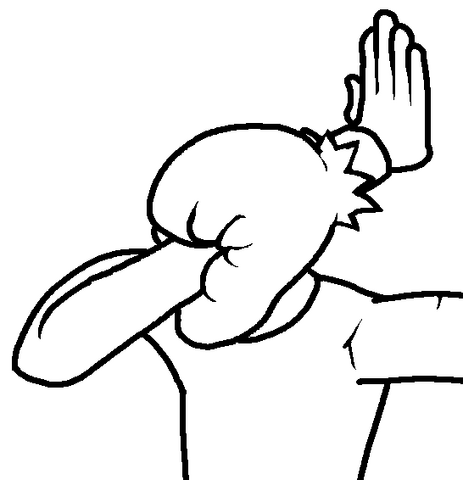The problem with articles like these is that, because they judge, critique and victimise collectively -- this is what *all* women have to put up with, and *all* men need to change -- is that you're not actively making a change: you're *hopeful* of the change simply as a product of those doing the abusing. That's like telling a friend at school that another kid in the school is bullying you, in the hope the bully will stop. That's all this is: as a group within the industry we acknowledge the abuse, but changing and shifting the culture won't come through a form of victimisation. It never has and it never will.
I'm not entirely against the idea of naming and shaming those that dish out such awful abuse, but victimisation is not a form of empowerment.
The industry needs empowered and empowering women. Writing an article about the sort of abuse you get from individuals, and then providing commentary that suggests a cultural shift as a collective, makes for an incapable approach to addressing the ways in which women are treated. It also completely invalidates the individual moral standing of men collectively, which is similarly as damaging for gendered approaches to fairness and respect as the abuse dished out by these despots. It's like fighting fire with fire.
Generally, whenever you try to address the issue of individuals moving beyond what is socially acceptable by treating those from the same group as a collective, you're not *actually* addressing the issue that causes these people to attack these women in this way. You're still creating a line that separates men and women, expecting everything to be miraculously fixed and for idiots to disappear from society.
As with racism the best way to attack it head on is to shame it, on an individual level wherever applicable. Telling me, "See! This is what I put up with!" while using people that post anonymously as a way to critique an entire group is an abhorrent way to address the issue, and it's an approach that continues to plague contemporary feminism.
Unfortunately, the industry lacks an empowered female voice of the likes of Sheryl Sandberg, someone that can rise above the abuse into a position of power.
It doesn't judge all men at all. It judges the behavior that is so common. That behavior happens to come from men (vast majority at least) but it doesn't judge the ones who don't do it. I'm not even sure what you're talking about with victimisation.
Second, no it's not at all the same as a bullied kid in school telling his friend about it. This is about raising awareness to the general public of the issue, and it really needs to be done. It's important that people speak up of their experiences. When people don't speak up (which is understandable because it's not an easy thing to do and when you do it you often get tons of unnecessary shit for it) of such experiences, nothing at all changes.
edit:
And yes, absolutely when individuals are caught doing this shit, they should be called out. This does happen every now and then, for example with David Jaffe.
Often it's not easy however. In GDC either this year or last year there was a woman talking about sexual discrimination in the industry (I read a local games magazine article about it but I don't have it here with me at the moment and I can't remember who it was). She told how when she was a bit younger she had met some well known and respected industry veteran (man). She had talked with him about games and development, but then all of a sudden he had taken his wee-wee out and showed it to her. She was like wtf but the situation was so incredibly surreal that she was naturally so confused and stunned that she just tried to ignore it and kept talking with him about the things she had been talking about, instead of calling him out right there.
Who was this man? That she didn't want to say in her presentation. She had no evidence anymore and if she had named him, it's very, very likely she would've got tons of shit for that and all kind of "no way I don't believe that", "you're just trying to attack him" etc etc and even direct attacks against herself.
As calling out individuals often isn't possible, it's extremely important that the general behavior gets called out.
Part of the problem you're going to run into with coming at it like this is that you will be called part of the problem for viewing a female in a sexual manner that dresses like that... trust me that argument is not pretty.
It's why I have a problem with the idea of 'rape culture' etc. The argument that will come is that these women should be able to wear whatever they want, clothing or not, scantily clad or not. If you make the argument "she's wearing those clothes for attention" you get lumped into the 'rape culture.'
(I don't watch any twitch stream like this)
I'm not sure if you saw my last reply to your post regarding a similar thing that you posted earlier:
Really, no offense, but you're part of the problem when you'd say that and when you think that.
Yes, it's possible that a woman wearing something is wearing it to get attention, but it's entirely possible she just wanted to wear it for whatever other reason (for example for a reason as simple as being used to it from her childhood - many children use quite revealing clothes and naturally they don't think about how much it reveals). Not one single person should ever have to think like "if I wear this, will everyone think I'm just looking for attention?".
But unfortunately, because your way of thinking is so common, so many women have to think about it daily. "Oh this shows my upper chest slightly, is that bad?" "This shows my thighs a little, is it too much?" "Will people ogle my boobs when I wear this shirt even though it covers them completely?"
Seriously, a woman doesn't even have to wear a thing that shows much skin at all to be often ogled at and have people thinking she's trying to get attention.
And yes, women should be able to wear practically anything they want without people thinking she's doing it for attention. That doesn't mean some things aren't appropriate, such as wearing only your underwear when going out or a very short miniskirt in a professional work environment.
edit: Simply viewing a woman dressing in a way that is attractive to you sexually is not a problem. It is a problem however if you think she's necessarily doing it for attention. She simply might like the dress for example.



